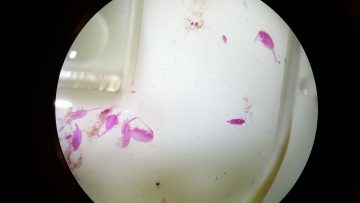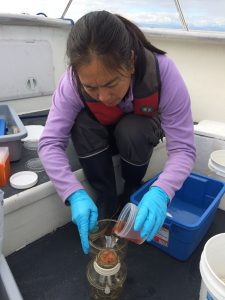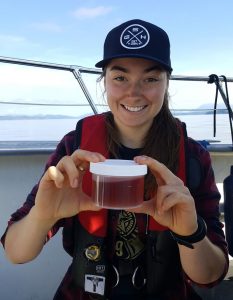The Hakai Coastal Initiative’s Marine Food Webs Working Group is a collaborative research unit that aims to understand how marine food webs operate, with a particular focus on British Columbia’s coastal ocean. Started in August 2018, the Group is projected to run for several years.
This initiative is spearheaded by Brian Hunt from the University of British Columbia’s Institute for the Oceans and Fisheries, Colleen Kellogg from the Hakai Institute, and Vera Tai from Western University in Ontario. UBC Hakai Coastal Initiative post-doctoral researchers from Brian Hunt’s lab working in the Group are Caterina Giner, who specializes in protozoa and is aiming to establish the seasonal and interannual drivers of unicellular autotrophic or heterotrophic organism composition, and Jacqueline Maud, who is establishing what zooplankton are feeding on within the protozoan community. Rosie Savage from the University of Western Ontario is also involved, studying the relationship between parasites and the mortality of zooplankton in particular.
The Group has a strong focus on understanding connections between the planktonic organisms that form the base of the food web, including the connections between viruses, bacteria, microbial phytoplankton, protozoa, zooplankton, and fish. Using an integrated approach, the Group is focusing on understanding how these components are connected, how the environment determines these connections, and the impact of these connections on ecosystem health, productivity and ability to provide support for factors like salmon or herring growth. Research will be focussed on high-resolution samples collected in the Strait of Georgia by the Hakai Institute’s Quadra Island ocean observatory, and supported by the station’s state-of-the-art research facilities.
 Globally, the connections between the lower trophic levels of marine food webs have not been clearly established, yet these connections are crucial: they determine the response of a system to change, particularly to climate change, and underpin marine food webs and the services that they provide. Understanding the connections between lower trophic levels may be the key to understanding why marine systems react in certain ways when pushed by specific changes, including warming, nutrient provisioning, and acidification. This in turn helps researchers understand the responses and state of higher trophic levels. Declines in salmon populations along the coast, for example, may be linked to the health of lower trophic levels. The information gained from this research can then be applied to ecosystem models for hindcasting or forecasting predictions of marine conditions in critical habitats such as the Strait of Georgia.
Globally, the connections between the lower trophic levels of marine food webs have not been clearly established, yet these connections are crucial: they determine the response of a system to change, particularly to climate change, and underpin marine food webs and the services that they provide. Understanding the connections between lower trophic levels may be the key to understanding why marine systems react in certain ways when pushed by specific changes, including warming, nutrient provisioning, and acidification. This in turn helps researchers understand the responses and state of higher trophic levels. Declines in salmon populations along the coast, for example, may be linked to the health of lower trophic levels. The information gained from this research can then be applied to ecosystem models for hindcasting or forecasting predictions of marine conditions in critical habitats such as the Strait of Georgia.
The Hakai Coastal Initiative’s Marine Food Webs Working Group will be using a range of research methods. These include cutting-edge molecular approaches to identify the composition of communities, and their response to the environment, and biogeochemical approaches that can trace food web linkages and inform researchers about the nutritional quality of food sources within ecosystems, such as the quality of zooplankton as prey for fish.
 This research initiative is poised to significantly advance our understanding of how marine food webs operate, and how they will respond to changing ocean conditions.
This research initiative is poised to significantly advance our understanding of how marine food webs operate, and how they will respond to changing ocean conditions.
By: Kristine Ho
Tags: Brian Hunt, British Columbia, coastline, faculty, fieldwork, food webs, Hakai Coastal Initiative, Hakai Institute, IOF postdoctoral fellows, Pelagic Ecosystems Lab, plankton, Research